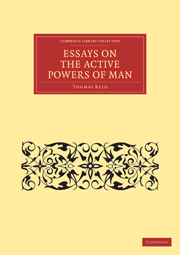
-
Select format
-
- Publisher:
- Cambridge University Press
- Publication date:
- October 2011
- May 2011
- ISBN:
- 9780511841712
- 9781108124690
- Dimensions:
- Weight & Pages:
- Dimensions:
- (297 x 210 mm)
- Weight & Pages:
- 1.21kg, 508 Pages
You may already have access via personal or institutional login
Book description
The Scottish philosopher Thomas Reid (1710–1796) first published Essays on Active Powers of Man in 1788 while he was Professor of Philosophy at King's College, Aberdeen. The work contains a set of essays on active power, the will, principles of action, the liberty of moral agents, and morals. Reid was a key figure in the Scottish Enlightenment and one of the founders of the 'common sense' school of philosophy. In Active Powers Reid gives his fullest exploration of sensus communis as the basis of all philosophical inquiry. He uses common sense realism to argue for the existence of a stable external world, the existence of other minds, and to offer a powerful challenge to versions of the Theory of Ideas advocated by Hume (1711–1776) and Locke (1632–1704). This is a key work of the Scottish Enlightenment that made important contributions to fundamental debates about the basis of philosophical inquiry.
Contents
Metrics
Full text views
Full text views help Loading metrics...
Loading metrics...
* Views captured on Cambridge Core between #date#. This data will be updated every 24 hours.
Usage data cannot currently be displayed.
Accessibility standard: Unknown
Why this information is here
This section outlines the accessibility features of this content - including support for screen readers, full keyboard navigation and high-contrast display options. This may not be relevant for you.
Accessibility Information
Accessibility compliance for the PDF of this book is currently unknown and may be updated in the future.


